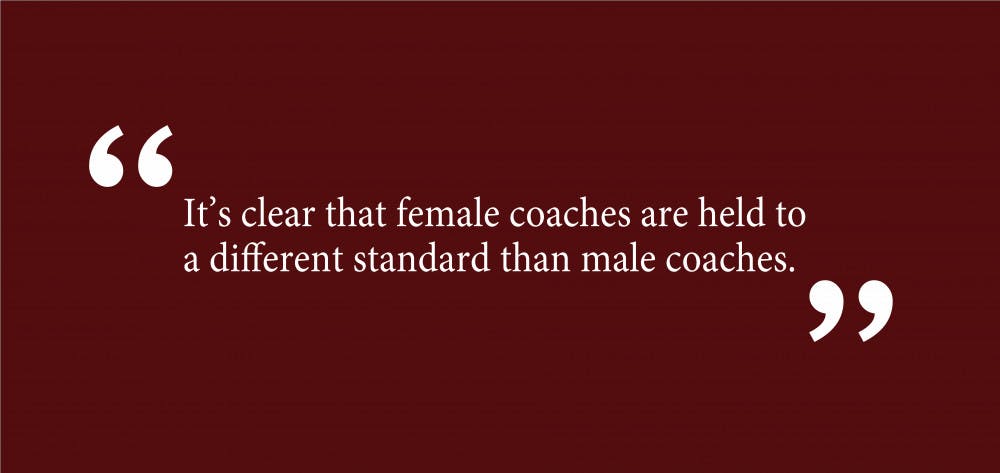The Feb. 24 Brown Daily Herald article announcing that the Brown Band will not perform at women’s basketball games to protest the head coach was chilling. Citing and reporting “allegations circulating” and “things we were hearing,” the band and The BDH threatened the career of a well-respected coach and educator.
Female collegiate coaches are among the most vulnerable population to be fired over claims of abuse and unfair treatment. Female coaches know that unlike their male colleagues, speculation is more than enough to remove them. One or two unhappy athletes can drown out all reason and the voices of legions of athletes who are happy with the coach’s performance. Will the Brown Band hold male coaches to the same standard? Will the band scrutinize the language and tone of male football coaches and the happiness of male football players to determine if they will play at football games?
It’s clear that female coaches are held to a different standard than male coaches. Just Google Tracey Griesbaum, Robin Sparks, Sue Parker and Stacy Johnson-Klein — all successful female coaches who were fired in recent years. Their stories all have similar components, patterns and outcomes. Some unhappy players were cited, abuse allegations were leveled and coaching positions were revoked. Many allegations of abuse leveled at female coaches are thinly veiled sexist accusations that the coach is not appropriately nurturing and maternal. Years of exemplary evaluations and player testimonies were disregarded, all because “allegations circulated” and “things (were) heard.”
In 2017-18, I was part of a group of Brown coaches and faculty who gathered regularly over the course of a year to discuss teaching, coaching, learning and performance. Sarah Behn was one of the core members of that group. Throughout the year, nine faculty and nine coaches met to discuss instructive readings and our coaching/teaching practices. We also visited each other’s classrooms and practices. For example, a faculty member and I visited the women’s basketball team practices and sat behind the bench at games. My colleague and I took notes on the interactions between players and coaches and examined Coach Behn’s practice plans. Her plans, like those of all the coaches and faculty involved, were shared across the group, and everyone agreed that they were a model of effective teaching. Moreover, by incorporating persuasive communications, writing, data science, research and reflection, she and the other coaches in the program demonstrated how their coaching practices contributed to the goals of a liberal education.
At the gatherings for coaches and faculty, we acquired a deeper understanding of low- and high-stakes learning environments. Brown athletic teams are high-stakes, high-stress learning environments that require student-athletes to take initiative, exercise creativity and assume responsibility for how their decisions and actions affect a team’s outcomes. When they succeed, athletes improve their skills and self-confidence; when they fail, they learn from the subsequent feedback from coaches and other players and revise their strategy. Whether on a basketball court, in a classroom or laboratory, failure can be gut-wrenching and learning can be uncomfortable. Voices may be raised, demands made, outcomes expected and patience tested. However, these learning environments are often the most necessary and transformative. Educators who can create valuable learning experiences in these high-stakes situations are rare and often the most memorable.
So, why is a well-respected coach being pilloried for being direct and corrective in her coaching style? Male coaches are rarely put under the same microscope for their interactions with players. I believe those who criticize Coach Behn have an unreasonable expectation that female coaches should adhere to gender-based norms of nurturing and maternal behaviors. They likely also expect us to subscribe to the trope that female coaches should create teams where players feel unconditionally supported while male coaches create teams that will equip their players to win. These are destructive, sexist stereotypes rooted in the belief that a woman’s primary charge in any setting is to be a domestic caregiver. Sarah Behn is an excellent coach and educator, but she’s not your mom.
Kerrissa Heffernan Ed.D serves as director of the Women’s Rugby Coaches and Referees Association and previously served as a Director of Engaged Sport at the Swearer Center for Public Service, Royce Fellowship Director and Brown University women’s rugby coach. She can be reached at kheffernan@uswrf.org. Please send responses to this opinion to letters@browndailyherald.com and op-eds to opinions@browndailyherald.com.





